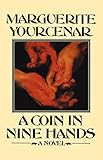Marguerite Yourcenar was born Marguerite de Crayencour in Brussels in 1903. She lost her mother at birth, her native Belgium at the age of six, and was forced to flee her adopted France at twelve. It is little wonder that Yourcenar, whose own early past receded so quickly into personal legend, would one day describe her writing as the "passionate reconstitution , at once detailed and free, of a moment or a man out of the past." One of the most respected writers in the French language, best known as the author of Memoirs of Hadrian and The Abyss, she was awarded countless literary honors, culminating with her election in 1980 to the Académie Française (she was the first woman ever to be so honored). As complex, erudite, and intriguing as her work, Yourcenar's life has resisted its own passionate reconstitution until now, in part because of the writer's deliberate elusiveness, even in her autobiographical trilogy.
Here, in its intricate and often contradictory detail, is Marguerite Yourcenar's story, one in which loss and learning intertwined almost from the first and in which love assumed a strangely paradoxical place. Drawing on letters, diaries, and interviews with Yourcenar's friends, colleagues, and lovers, Josyane Savigneau's biography paints an intimate portrait of an artist who lived according to her own, occasionally contrary, terms: a Frenchwoman ardently in love with her native tongue, yet who lived half her life in New England; an avid seductress of women, who spent nearly forty years with one woman, yet fell in love early and late in her life with two young men; a powerful female writer whose most memorable protagonists were male, from Alexis of her first novel to the later historical characters Hadrian and Zeno. Savigneau weaves these and other contraries of Yourcenar's life into a vibrant and engrossing pattern.
Editor of "Le Monde des Livres," the literary pages of France's most influential newspaper, Savigneau first met Marguerite Yourcenar on assignment in 1984. What began as a professional relationship gradually turned into a friendship. Her personal insights into that life enrich this exhaustively documented text. Following the lead set by Yourcenar in her memoir Dear Departed, the biographer found herself "searching for a truth that is multiple, unstable, evasive, sometimes saddening, and at first glance scandalous but that one cannot approach without often feeling for human beings in all their frailty a certain measure of kinship and, always, a sense of pity." Yourcenar's profound intelligence and sympathy, her foibles and obsessions, her accomplishments and trials: all are revealed here in an uncompromising portrait of an incomparable artist.















